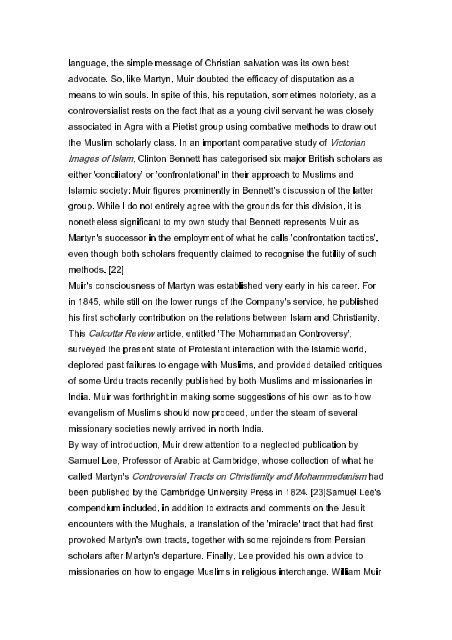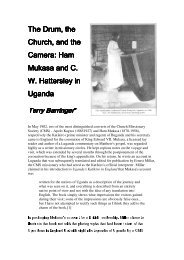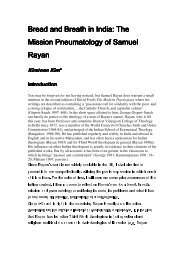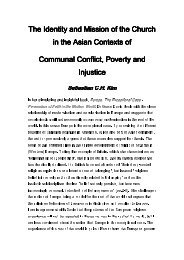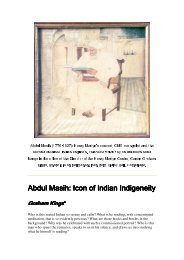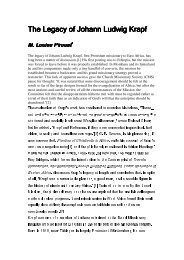the legacy of henry martyn to the study of india's muslims and islam ...
the legacy of henry martyn to the study of india's muslims and islam ...
the legacy of henry martyn to the study of india's muslims and islam ...
Create successful ePaper yourself
Turn your PDF publications into a flip-book with our unique Google optimized e-Paper software.
<strong>the</strong> simple message <strong>of</strong> Christian salvation was its own best advocate. So, like Martyn, Muir doubted <strong>the</strong> efficacy <strong>of</strong> disputation as a means <strong>to</strong> win souls. In spite <strong>of</strong> this, his reputation, sometimes no<strong>to</strong>riety, as a controversialist rests <strong>the</strong> fact that as a young civil servant he was closely associated Agra with a Pietist group using combative methods draw out language,<br />
Muslim scholarly class. In an important comparative <strong>study</strong> <strong>of</strong> Vic<strong>to</strong>rian Images <strong>of</strong> Islam, Clin<strong>to</strong>n Bennett has categorised six major British scholars as ei<strong>the</strong>r 'concilia<strong>to</strong>ry' or 'confrontational' <strong>the</strong>ir approach <strong>to</strong> Muslims <strong>and</strong> Islamic society: Muir figures prominently in Bennett's discussion <strong>of</strong> <strong>the</strong> latter group. While I do not entirely agree with grounds for this division, it is<br />
significant <strong>to</strong> my own <strong>study</strong> that represents Muir as Martyn's successor in <strong>the</strong> employment <strong>of</strong> what he calls 'confrontation tactics', even though both scholars frequently claimed <strong>to</strong> recognise <strong>the</strong> futility <strong>of</strong> such none<strong>the</strong>less<br />
[22] Muir's consciousness <strong>of</strong> Martyn was established very early in his career. For in 1845, while still <strong>the</strong> lower rungs <strong>of</strong> <strong>the</strong> Company's service, he published<br />
first scholarly contribution on <strong>the</strong> relations between Islam <strong>and</strong> Christianity. This Calcutta Review article, entitled 'The Mohammadan Controversy', methods.<br />
<strong>the</strong> present state <strong>of</strong> Protestant interaction with <strong>the</strong> Islamic world, deplored past failures <strong>to</strong> engage with Muslims, <strong>and</strong> provided detailed critiques <strong>of</strong> some Urdu tracts recently published by both Muslims <strong>and</strong> missionaries in India. Muir was forthright in making some suggestions <strong>of</strong> his own as <strong>to</strong> how evangelism <strong>of</strong> Muslims should now proceed, under <strong>the</strong> steam <strong>of</strong> several surveyed<br />
societies newly arrived in north India. By way <strong>of</strong> introduction, Muir drew attention <strong>to</strong> a neglected publication by Samuel Lee, Pr<strong>of</strong>essor <strong>of</strong> Arabic at Cambridge, whose collection <strong>of</strong> what he missionary<br />
Martyn's Controversial Tracts Christianity <strong>and</strong> Mohammedanism had been published by <strong>the</strong> Cambridge University Press 1824. [23]Samuel Lee's compendium included, in addition extracts <strong>and</strong> comments on <strong>the</strong> Jesuit encounters with <strong>the</strong> Mughals, a translation <strong>of</strong> <strong>the</strong> 'miracle' tract that had first provoked Martyn's own tracts, <strong>to</strong>ge<strong>the</strong>r with some rejoinders from Persian called<br />
after Martyn's departure. Finally, Lee provided his own advice <strong>to</strong> missionaries on how <strong>to</strong> engage Muslims in religious interchange. William Muir scholars


